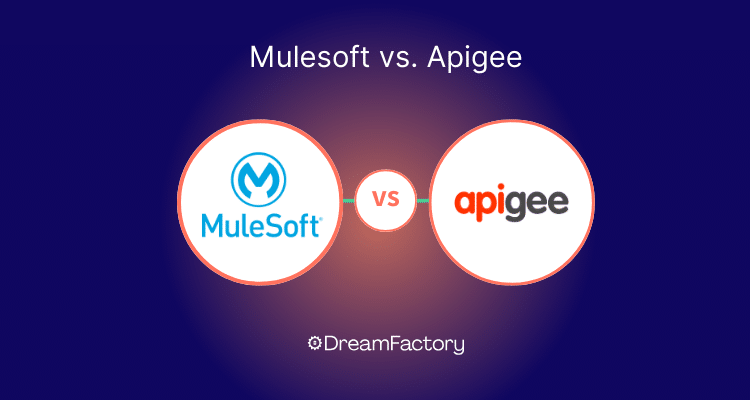As businesses move toward digital transformation to harness the efficiency of new technologies, they need reliable ways to connect their SaaS applications and other tools. Adopting the right API management platform can make that task much easier. As you explore your options, you will likely find a lot of information about MuleSoft Anypoint and Apigee Edge. The following comparison will help you determine whether one of these API management platforms matches your needs.
Here's the key takeaways to know from this comparison of MuleSoft and Apigee:
- MuleSoft is a well-known development company offering a wide range of tools. It is recommended for individuals and organizations seeking API management solutions for integrating applications and microservices.
- Key features of MuleSoft Anypoint that stand out for enterprise clients include flexible hosting options (on-premises, cloud, or hybrid), the ability to use reusable assets for accelerated API and integration development, real-time analytics for monitoring everything from caching to runtime, and a strong focus on full lifecycle API management and iPaaS.
- Google Cloud Apigee Edge, initially established in 2004 and subsequently acquired by Google Cloud in 2010, provides API management solutions with the flexibility to select either cloud or on-premises hosting.
- Noteworthy features of Apigee Edge include robust security features such as TLS and OAuth, efficient API load balancing, an intuitive dashboard with graphics-based analytics, and AI-powered API monitoring capabilities.
- A comparison of customer support between MuleSoft and Apigee highlights the availability of various support tiers, comprehensive documentation, active community engagement, and training and certification options for users of both platforms.
Table of Contents
What Is MuleSoft Anypoint?
MuleSoft is a popular development company with a broad range of tools. Anyone interested in managing APIs that can integrate applications and microservices will want to consider MuleSoft Anypoint.
What Features Can You Expect From MuleSoft Anypoint?
Features that stand out for enterprise clients using MuleSoft Anypoint usually include:
- The option to choose on-premises, cloud, or hybrid hosting.
- Reusable assets that make API and integration development fast.
- An interface with real-time analytics to track everything from caching to runtime.
- A focus on full lifecycle API management and iPaaS.
What Is Google Cloud Apigee Edge?
Apigee started providing API management software in 2004, but Google Cloud acquired the company in 2010. Even though Google Cloud owns Apigee and its Apigee Edge API solution, clients can choose cloud or on-premises hosting. They don’t have to use Google Cloud, either. Clients can select any hosting option they prefer, however, you will lose some features if you choose Private Cloud.
What is DreamFactory?
DreamFactory is a powerful API generation tool that unlocks a multitude of benefits for development teams, front-end developers, back-end/API developers, and enterprise architects alike. By automating the process of creating REST APIs, DreamFactory streamlines development workflows and enhances security, ultimately accelerating innovation and improving application reliability. Here's a closer look at the advantages it brings to different stakeholders:
Recommended reading: Instant APIs for Your ESB: MuleSoft & DreamFactory
What Is Google Cloud Apigee Edge?
Apigee started providing API management software in 2004, but Google Cloud acquired the company in 2010. Even though Google Cloud owns Apigee and its Apigee Edge API solution, clients can choose cloud or on-premises hosting. They don’t have to use Google Cloud, either. Clients can select any hosting option they prefer, however, you will lose some features if you choose Private Cloud.
What Features Can You Expect From Apigee Edge?
Some users feel that Apigee Edge requires a little more expertise to use than MuleSoft does. Still, Apigee gives you excellent features and affordable pricing. Some of the features you might find attractive include:
- Strong security via TLS and Oauth.
- API load balancing that doesn’t force specific servers to work too hard.
- A dashboard the intuitive, graphics-based analytics that Google is known for.
- AI-powered API monitoring.
Recommended reading: Apigee API Generator: Easily Create APIs for Your Apigee Suite
Customer Support: MuleSoft vs. Apigee
When choosing an API management platform like MuleSoft or Apigee, the quality of customer support can significantly impact your experience. Let's explore the differences in customer support between these two platforms:
MuleSoft:
MuleSoft has a reputation for offering robust customer support services. Here are some key aspects of MuleSoft's customer support:
- Support Tiers: MuleSoft typically provides multiple support tiers to cater to various customer needs. These tiers may include options for standard support, premium support, and even 24/7 support, allowing customers to choose the level of assistance that best aligns with their requirements and budget.
- Documentation: MuleSoft offers extensive documentation, including developer guides, tutorials, and API references. This resource can be invaluable for users seeking self-help and guidance during development.
- Community Engagement: MuleSoft maintains an active user community where developers and administrators can seek help, share best practices, and troubleshoot issues collectively. The community forums and discussions are valuable for getting insights from peers.
- Training and Certification: MuleSoft provides training programs and certifications for users who want to enhance their skills and knowledge of the platform. These programs can be especially helpful for developers looking to become MuleSoft Certified Professionals.
Apigee:
Apigee, as a part of Google Cloud, offers robust customer support as well. Here's what you can expect from Apigee's customer support:
- Google Cloud Support: Apigee clients benefit from Google Cloud's renowned support infrastructure. Google Cloud provides a wide range of support options, including standard, premium, and enterprise-grade support, with varying levels of responsiveness and assistance.
- Documentation and Knowledge Base: Apigee offers extensive documentation, tutorials, and a knowledge base to help users understand the platform's features and capabilities. These resources are designed to assist users in setting up and managing their APIs effectively.
- Community and Forums: Apigee has an active community and user forums where developers and administrators can seek advice, share experiences, and find solutions to common issues. Google Cloud's broader community also contributes to a wealth of knowledge.
- Training and Certification: Like MuleSoft, Apigee provides training and certification programs to help users become proficient in using the platform and validating their expertise.
Pricing: MuleSoft and Apigee
When comparing Mulesoft and Apigee, two leading platforms in the API management space, their pricing structures present distinct differences catering to varied organizational needs.
Mulesoft
Mulesoft's pricing model is generally known for being feature-rich and enterprise-focused. It offers a tiered pricing structure, which includes various levels based on the scale of usage and the range of features required. Mulesoft's Anypoint Platform provides custom pricing based on the number of API calls, the data volume processed, and the level of functionality needed, such as API design, development tools, and management capabilities. This makes Mulesoft a potentially costlier option, but one that is highly scalable and suitable for large enterprises with complex integration needs.
Apigee
On the other hand, Apigee, part of Google Cloud, offers a more flexible pricing model. It provides a range of plans including a free tier, which is particularly attractive for smaller businesses or those just beginning their API management journey. Apigee's paid plans are based on API call volumes and operational metrics, allowing for more predictable cost planning. While it can be more accessible price-wise for small to medium-sized businesses, Apigee also scales up effectively for larger enterprise needs.
Pros and Cons of MuleSoft and Apigee
Visit DreamFactory’s Features page to see how it helps organizations connect their assets.
MuleSoft Anypoint Platform Pros
- High availability and scalability.
- Can integrate diverse assets, including SalesForce, legacy systems, and microservices.
- Developer portal lets coders improve the functionality of connectors.
- Discoverability makes it faster and easier to reuse existing APIs.
MuleSoft Anypoint Platform Cons
- Doesn’t offer the level of API documentation today’s users expect.
- Version control doesn’t let users roll back to previous versions when they desire.
- Has relatively high pricing for some clients.
Apigee Edge Pros
- Strong security features.
- Excellent load balancing.
- API proxy options easy to implement.
- Allows branding so companies can position themselves as problem solvers.
Apigee Edge Cons
- Could use more features to make it a better API gateway solution.
- API calls and traces limited to 20 instances.
- Some users find the naming conventions confusing.
MuleSoft vs. Apigee vs. DreamFactory: Which Is Right for You?
Choosing the right API management platform is a critical decision that can significantly impact your organization's development and integration efforts. MuleSoft, Apigee, and DreamFactory are all powerful solutions, but they have distinct strengths and use cases. Here's a comparative look at these three platforms to help you determine which one aligns best with your specific needs:
MuleSoft Anypoint:
- Strengths:
- Comprehensive Integration: MuleSoft is renowned for its robust integration capabilities, making it an ideal choice for organizations dealing with complex integration scenarios, including Salesforce, legacy systems, and microservices.
- High Availability: It offers high availability and scalability, ensuring that your APIs perform reliably even under heavy loads.
- Developer-Friendly: MuleSoft's developer portal and discoverability features empower coders to enhance connectors and speed up development.
- Consider If:
- You require extensive integration capabilities for a diverse range of assets.
- Scalability and high availability are critical for your API infrastructure.
- Your developers prefer a user-friendly interface and tools for rapid development.
Apigee Edge:
- Strengths:
- Strong Security: Apigee Edge prioritizes security with TLS, OAuth, and robust API proxy options, making it an excellent choice for organizations that prioritize data protection.
- Analytics: It offers intuitive, graphics-based analytics that enable you to gain insights into API usage and performance.
- AI-Powered Monitoring: Apigee Edge leverages AI for API monitoring, helping you proactively identify and address issues.
- Consider If:
- Security is a top concern, and you need features like TLS and OAuth.
- You require advanced analytics and AI-driven monitoring for API performance.
- Branding and positioning your company as a problem solver are important.
DreamFactory:
- Strengths:
- Automated API Generation: DreamFactory excels in automatically generating REST APIs for various data sources, simplifying and expediting the development process.
- Security and Authentication: It offers robust security features, including RBAC, OAuth, and LDAP integration, ensuring secure data connections.
- Server-Side Scripting: DreamFactory supports server-side scripting with multiple scripting engines, allowing for custom logic in API endpoints.
- Consider If:
- You need to quickly generate and document REST APIs from different data sources.
- Security and authentication are paramount, and you prefer options like RBAC and OAuth.
- Customization and scripting are essential for your API requirements.
Other API Management Platforms to Consider
If you don’t think Apigee Edge or MuleSoft Anypoint meets your needs, consider learning more about the following API management platforms.
- Akana
- Amazon API Gateway (AWS)
- Axway
- Azure API Manager
- Kong
- Microsoft Azure API Management
- SAP
- Swagger
- TIBCO Mashery
- Tyk
- WSO2 API Manager
Get a Free DreamFactory Trial for Secure API Solutions
DreamFactory has an intuitive dashboard that gives everyone the access control they need to manage API. The solution offers a no-code platform, so you don’t need much experience to create and manage your APIs. Many users love DreamFactory because it can automatically generate REST APIs from SOAP. Other benefits include:
- Live API documents.
- Instant API creation.
- API limits.
- Server-side scripting.
You can choose between an on-premises, cloud-based, or hybrid solution that meets your needs best.
Discover the advantage of managing and creating APIs with DreamFactory by signing up for a free 14-day trial. Once you see how easy DreamFactory makes API management, you will never go back to other solutions.
Terence Bennett, CEO of DreamFactory, has a wealth of experience in government IT systems and Google Cloud. His impressive background includes being a former U.S. Navy Intelligence Officer and a former member of Google's Red Team. Prior to becoming CEO, he served as COO at DreamFactory Software.
























 Blog
Blog


